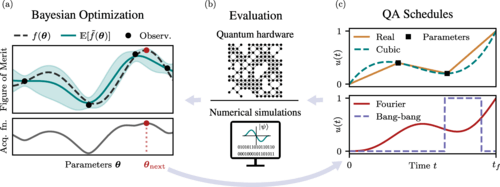Quantum annealing (QA), a computational paradigm used to solve combinatorial optimization problems, faces challenges such as vanishing gaps during the anneal. To address this, researchers have proposed using Bayesian optimization (BO) to design high-quality QA schedules. BO is a global optimization strategy that is cost-effective, making it suitable for optimizing quantum annealing schedules. The research shows that BO can design QA schedules that result in significantly better fidelities than standard protocols. It also demonstrates that BO can improve the design of hybrid quantum algorithms for hard combinatorial optimization problems. The research was conducted by scientists from various institutions, including BMW AG, Amazon Quantum Solutions Lab, and Tokyo Institute of Technology.
What is Quantum Annealing and How is it Optimized?
Quantum annealing (QA) is a computational paradigm that has gained significant interest over the past few years due to its potential to encode and solve combinatorial optimization problems. These problems have important applications across various fields of science and industry. However, QA is not without its challenges. One of the most notable issues is the problem of vanishing gaps during the anneal, which results in the run time of QA scaling exponentially for some problems.
To overcome this problem, several extensions have been proposed, such as leveraging diabatic effects, counter-diabatic driving, and reverse annealing. Recently, variational quantum adiabatic algorithms have been proposed, in which a classical optimizer designs QA schedules within a larger hybrid quantum-classical computation. The goal is to find schedules with the ability to automatically adjust these to the gap structure of the Hamiltonian at hand, for example, by adjusting the annealing speed with which different parameter regions are traversed, or in the form of diabatic paths which circumvent the need to adhere to the adiabatic speed limit.
Several methods have previously been proposed to find such optimized schedules, including optimal control techniques, genetic algorithms, machine learning techniques, as well as several other gradient-based and gradient-free optimizers.
How Does Bayesian Optimization Contribute to Quantum Annealing?
In this work, the use of Bayesian optimization (BO) to design high-quality QA schedules with minimal user requirements is considered. BO is a widely used global optimization strategy, especially useful when optimizing black-box cost functions that are expensive to evaluate, be it in terms of run-time or actual monetary cost. This frugal nature of BO makes it an attractive candidate to optimize quantum annealing schedules, especially in the current noisy intermediate-scale quantum (NISQ) era where access to quantum devices is limited and expensive.
Previously, BO has already been used to prepare desired states in ultra-cold gases, to find optimal angles in the quantum approximate optimization algorithm (QAOA), and to improve QA on D-Wave quantum annealers.
What are the Results of Using Bayesian Optimization for Quantum Annealing?
The use of BO for preparing ground states or low-energy states of two paradigmatic spin models is investigated. It is shown that simple hands-off BO schemes are able to design QA schedules resulting in fidelities several orders of magnitude better than simple linear schedules. Additionally, reverse annealing (RA) schedules for the p-spin model are designed and it is shown that BO can identify schedules that successfully circumvent the first-order phase transition.
Numerical evidence is presented that these BO-designed RA schedules are robust against dephasing noise, thereby providing an improvement to previous limitations while using RA. Finally, attention is turned to the NP-hard maximum independent set (MIS) problem. It is demonstrated both in numerical simulations and on actual quantum hardware available on Amazon Braket that BO can be used to design efficient protocols to solve the MIS problem.
What is the Significance of this Research?
This research proposes and analyzes the use of Bayesian optimization techniques to design quantum annealing schedules with minimal user and resource requirements. The results showcase that Bayesian optimization is able to identify schedules resulting in fidelities several orders of magnitude better than standard protocols for both quantum and reverse annealing as applied to the p-spin model.
Furthermore, it is shown that this scheme can help improve the design of hybrid quantum algorithms for hard combinatorial optimization problems such as the maximum independent set problem. These results are illustrated via experiments on a neutral-atom quantum processor available on Amazon Braket.
Who are the Key Players in this Research?
This research was conducted by a team of scientists from various institutions. The team includes Jernej Rudi Finžgar from BMW AG and the Technical University Munich School of CIT Department of Computer Science, Martin J A Schuetz from Amazon Quantum Solutions Lab and AWS Center for Quantum Computing, J Kyle Brubaker from Amazon Quantum Solutions Lab, Hidetoshi Nishimori from the International Research Frontiers Initiative Tokyo Institute of Technology, Graduate School of Information Sciences Tohoku University, and RIKEN Interdisciplinary Theoretical and Mathematical Sciences, and Helmut G Katzgraber from Amazon Quantum Solutions Lab.
What is the Future of Quantum Annealing and Bayesian Optimization?
The results of this research suggest that Bayesian optimization has a promising future in the field of quantum annealing. By identifying schedules that result in significantly better fidelities than standard protocols, and by demonstrating the ability to improve the design of hybrid quantum algorithms for hard combinatorial optimization problems, Bayesian optimization proves to be a valuable tool in the advancement of quantum computing.
As access to quantum devices continues to be limited and expensive, the frugal nature of Bayesian optimization makes it an attractive candidate for further research and application in the field. The successful application of Bayesian optimization in this research provides a strong foundation for future studies and advancements in quantum annealing and quantum computing as a whole.
Publication details: “Designing quantum annealing schedules using Bayesian optimization”
Publication Date: 2024-04-18
Authors: Jernej Rudi Finžgar, Martin J. A. Schuetz, J. Kyle Brubaker, Hidetoshi Nishimori, et al.
Source: Physical review research
DOI: https://doi.org/10.1103/physrevresearch.6.023063

